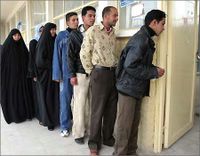Don't be a fool and die for your country. Let the other sonofabitch die for his.
-- General George S. Patton
February 01, 2005
'Martyrs' And Martyrs
Now, I'm not one for much religious review or putting things into a religious perspective, but this is a really good look at the bastardization of the word martyr.
From the WA Times.com:
Commentary: In Iraq, 'martyrs' and martyrsBy Uwe Siemon-Netto
UPI Religious Affairs EditorGurat, France, Jan. 31 (UPI) -- The Greek term "martyr," meaning witness, has always had a noble ring until it was usurped by contemporary criminal maniacs killing themselves and thousands of innocent people.
Iraq's election Sunday has returned nobility to martyrdom - no thanks to suicide bombers themselves in their relentless war of terror against chiefly women and children, but because of those millions of voters who braved death to bring about a better life for themselves, their neighbors and children.
And martyrs - witnesses -- they were indeed, leaving their homes despite threats from terrorists that Iraq's streets would be awash in the voters' blood. Yes, it was an act of martyrdom to bring the kids along to the polling stations so that they will one day witness to their own children that they were there at this momentous event in their country's and the Middle East's history.
There is a religious and a profane martyrdom ("shahadat" in Arabic). The two are often intertwined not only in Islam, which does not separate secular from religious realities. Those who resisted Hitler did so out of love for their fellow man -- and for God.
Theologian Dietrich Bonhoeffer knew that he would probably die when he returned to Germany from the safety of a teaching position in the United States in 1939. But to resist Hitler was to him a sacred as well as a civic duty.
Of course you can be a martyr and not get killed; thankfully this proved to be by and large the case in Iraq. But these voters were fully prepared to die, putting in their place international cynics who belittled these elections as a sham.
And they did so less out of selfishness than the suicide bombers who murder indiscriminately in Baghdad, Israel or in New York, where they flew hijacked planes into the World Trade Center.
The Iraqi voters courted death for the sake of democracy not knowing if they would live to benefit from it in their lifetime; certainly the 94-year old woman who was rolled into a polling station on a wheelbarrow in Mosul could not entertain such expectations.
The murderous "martyrs" terrorizing Iraq and its neighbors and the rest of the world do so on the promise of fast-forwarding to Paradise filled with lovely virgins, although the world's Christians, Jews, seculars and presumably most Muslims would rather caution them not to be too optimistic in this regard.
The ambiguity of how this latter form of "martyrdom" will be received in the Hereafter is theologically one of the most fascinating aspects of present-day Islam.
While this faith sees martyrdom in the form of self-sacrifice as virtuous because it bears witness to God's existence and strengthens the community, it also resolutely denies human autonomy.
"One's life is a trust from God, which demands an ongoing relationship between the Creator and the caretaker," according to Islamic theologian Abdulaziz Sachedina of the University of Virginia.
"Suicide, as self-murder, is judged accordingly as an affront to God, the individual and the community."
Some of the murderers of Sept.11, 2001, exacerbated this aspect of evident godlessness when they bade farewell to the world by enjoying themselves one last time in houses of ill repute.
Far from being religiously devout in the traditional sense, Islamists have reinterpreted the classical ethical notion of martyrdom "in an attempt to appropriate different themes and sociopolitical patterns in postmodernity," writes sociologist of religion Babak Rahimi of the European University Institute in Florence, Italy.
In other words, this form of "martyrdom" has less to do with faith than with ideology.
As a consequence, the Islamists have given their religion a terrible name worldwide - the name of a faith whose "martyrs" randomly kill women and children, as opposed to Christianity, which views martyrdom as none other than radical discipleship -- the full imitation of Christ: "If they persecuted me, they will persecute you, too" (John 15:20).
Seen in this light, Iraq's election has a very powerful religious dimension: With their bravery and willingness to accept martyrdom, these voters have made a huge contribution to the restoration of Islam's image as a credible religion - an image so gravely tarnished by killers and thugs for far too long.
H/T to the Blog Mama for the link.
SlagleRock Out!
